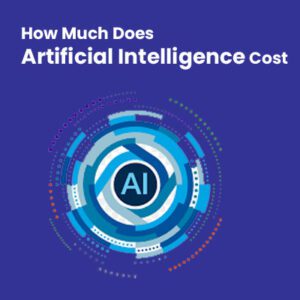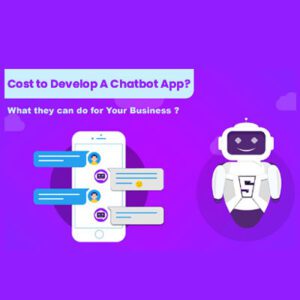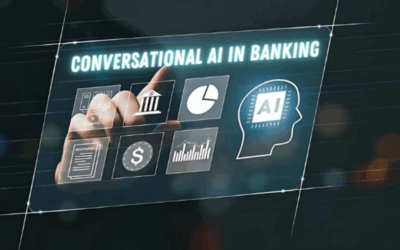How Do I Get Into AI Development? Where Do I Start?
How Do I Get Into AI Development? Where Do I Start?
Artificial intelligence is one of the hottest topics in the world of software engineering. No matter how long you have been in the field, or if you are coming to programming from a completely different field, the basic foundation in Artificial Intelligence and machine learning will not only help you move your career forward, but also open your mind to several ways of solving problems beyond the realm of algorithms.
Will Artificial Intelligence Be The Next Digital Frontier?
It is miserable that Covid-19 pandemic has destroyed millions of jobs, although big tech giants are increasing the usage of artificial intelligence. McKinsey’s 2017 report estimates that one-third of employers in the USA will be replaced by robots and automation by the decade 2030. These pandemic situations definitely change at all times. But humans need to decide how they want to integrate this advanced technology into the globe.
- Gartner said that 30% of all B2B companies will hire AI technology to boost their one of the sales processes.
- As per the reports of DemandBase, 80% B2B marketing executives proclaimed AI have announced that they will revolutionize the marketing industry by the end of 2020.
- IDC estimates that by 2021, 75% of commercial applications will use Artificial Intelligence.
2021 is actually an open door for professionals who are already engaged in AI. So, if you are keen in starting a career with artificial intelligence, here is a guide you can follow today:
1) Having a solid background in mathematics is very important
You should at least have a basic knowledge of maths and calculus to train neural networks. You need to have knowledge on probability and statistics and other algorithms to get into the AI.
So, it’s better to learn as much mathematics as you can before entering into the best AI courses and other learning resources in Artificial Intelligence that you can find.
2) Reduce your focus: What do you want to build?
Make your goal clear and make it fit a simple sentence; For example, “developing an algorithm to estimate a person’s blood pressure”.
Then only you will be able to Lower your focus (broader term for AI), divide your problem into smaller parts and identify the specific resources you required.
3) Learn by doing AI: Try to solve simple problem for a start
Initially, you can to write a simple neural net first and then focus on the more complex problems.
In the beginning, solve an easy problem. Experiment with diferent approaches to algorithmic decision making when trying to solve it.
Enter into the world of AI software development by finding a quick fix to a given issue. You can also learn a simple ML algorithm and slowly evaluate its performance.
Next, improve your knowledge and skills by optimizing your basic solution. You can also upgrade various components and observe the resulting change.
You can also put your hands on writing AI code for various games, such as Tic Tac Toe and Sudoku, creating code for pattern recognition and building your own simulator.
4) Start with in-depth practice: Learn about artificial neural networks
Newly, you should be particularly interested in deep learning, is what I say true?
Now, if you would like to explore this ML technique, you need to know the basics of artificial neural networks.
In this case, you can brighten up this online resource with Deep Learning.
For the open source framework to use to test your newly acquired skills:
- Google-powered Tensorflow, one of the most popular; Python based one
- Skit-Learn, Caras, and Theano, all Python based frameworks
- Java Framework named ‘Deeplearning4j’
5) Select Your Programming Language: Consider Libraries Availability and Performance
Choosing a programming language is very important when you decide to learn AI development course.
Go for the mainstream language (although you can do artificial intelligence and machine learning with less popular languages). One that:
Offers you with many high-quality libraries and software development tools
Stands in terms of performance So, it could be Octave, Python, C ++, or Java. Everyone has its own limitations and strengths when it comes to performance and the availability of libraries.
This is especially important when you are doing in-depth research in the field of natural language processing.
6) Learn the theory of computational learning to enter into AI development
This is especially important when you are doing in-depth research in the field of NLP (Natural Language Processing).
7) Use a Cloud-Based One or Build a Powerful Computing Hardware
Expect some crucial hardware requirements to implement machine learning and run AI.
If you plan to use a powerful hardware system, a bundle of CPUs and high-performance GPUs is necessary:
Here are the two options:
- You can go with the cloud based alternative
- You can put together your own powerful super machine
Following are the two popular cloud computing platforms to consider:
Google Collab: Jupiter notebook environment that requires no setup; you can get quick access to a cloud-based GPU to execute your scripts.
Cloud TPU: A Google-based hardware custom designed to perform tensor operations more efficiently than a CPU or GPU.
8) Get acquainted with many ML- Algorithms
If you decide to start a career in artificial intelligence development you must be comfortable with other deciduous trees and random forests
- Repetitive Neural Networks (RNN)
- Support vector machines (SVM)
- Deep Learning (DL)
9) Enter a Kaggle Competition
Put your newly acquired skills to the test!
You can also try to solve the problems that other expert AI mobile app Developers are doing by participating in a Kaggle competition. Test out multiple ways and go with the most effective solution.
10) Free online courses to try your hand
Last but not least, online courses. Following are the three best Artificial intelligence courses to learn online.
Learn with Google AI – This is the latest project launched by Google to help people understand what Artificial Intelligence is and how does it work. Though resource is slowly growing, it already has a machine learning course for freshers who already own Google’s Tensor Flow library. This course also helps those who don’t even have a basic knowledge of AI and machine learning, explains the key principles of designing neural networks and introduces Tensorflow.
Stanford University – Machine Learning –
This online course is taught by the founder of Google Brain, Andrew Nga and is available on Coursera. It is free to use and select paid options if you would like to get a certificate that can be used in the future. This course will introduce you to examples of real-life AI-driven technologies such as advanced mechanisms of speech recognition and web search. Through this course, you will also get the basic knowledge of neural networks.
Nvidia – Fundamentals of Deep Learning for Computer Vision –Computer vision focuses on creating computers that can analyze visual information like the human brain. This course covers the required technical fundamentals along with practical applications of object recognition and objects classification.
Conclusion
Understanding of machine learning and artificial intelligence becomes more valuable in any profession and field of business. Thanks to several online courses, today you do not have to go to any institution to learn this interesting and complex technology. Even you are not from technical background, you can get trained on AI from home and start using your skills and knowledge in practice, create simple ML solutions and take initial steps towards your dream profession.
If you want to learn more about the AI technology, please contact us. We would love to help you.






















